CSotD: Asking the Unaskable Questions
Skip to commentsNote: One of my father’s favorite expressions was “If you don’t want to know the answer, don’t ask the rebbi.” This would be an excellent day to skip reading if you don’t want to know.

Rob Rogers brings up a matter you’re not supposed to bring up, which makes me wonder if any newspapers will run it.
People will be offended that I’m running it and other cartoons on the topic, but if you aren’t allowed to ask the question, it casts doubt on the value of the answer.
Two observations, based on my relatively deep knowledge of the Troubles in Ulster in the ’70s and ’80s:
- Most people aren’t political, and they condemn violence and the “hard men” of both sides.
- Most people are loyal to their kinfolk, and when there is trouble, they will defend those with whom they identify.
It was true in Ulster, it was true in Vietnam and surely it’s true in the Middle East.
Peace came to Ulster through a combination of two things: One was the rising up of people who demanded peace, which was rewarded with a Nobel Peace Prize in 1976.
The other was a change in government, both in the UK overall and Northern Ireland specifically, which led to a willingness to talk and another Peace Prize, this in 1998.
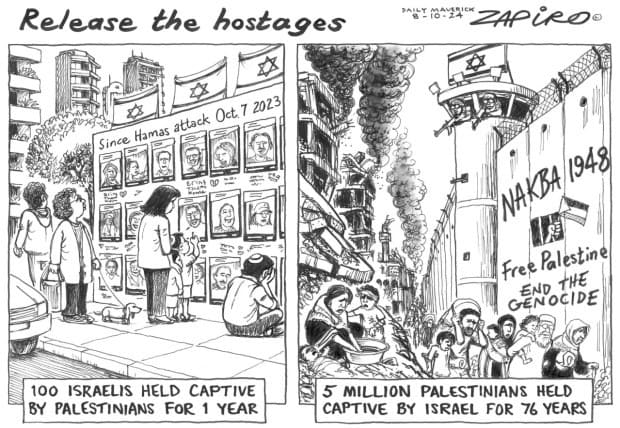
Zapiro points to one major difference, because, when violence broke out in the Six Counties, the Plantation of Ulster that forced out many Catholics was two hundred years in the rearview mirror, while partition was more a political than a personal issue.
By contrast, the Nakba remains an open sore, with people still alive who remember being forced out of their homes and fresh wounds on the West Bank where settlements spring up regularly, displacing more Bedouins and Palestinians.

As for governance, Cathy Wilcox notes the contrast between her own prime minister’s comments on the anniversary of the October 7 attacks and those of Israeli Security Minister Itamar Ben-Givr, a far-right militant who is calling for deportation of families of those convicted of terror, and who has himself been convicted of racism and supporting a terrorist organization.
Ben-Givr represents an ultranationalist, extremist party that is part of Benjamin Netanyahu’s fragile and contentious coalition, and that favors expulsion of Arabs from Gaza and the West Bank. Ben-Givr threatened Israeli Prime Minister Yitzhak Rabin — winner of the 1994 Nobel Peace Prize along with long-time political rival Shimon Peres and PLO leader Yasser Arafat — shortly before his assassination.
As Wilcox suggests, his presence in Netanyahu’s cabinet does not bode well for peace in the region.
Meanwhile, I would suggest, being against his presence in government is no more anti-Semitic than being against the assassination of Lord Montbatten meant you hated Catholics.
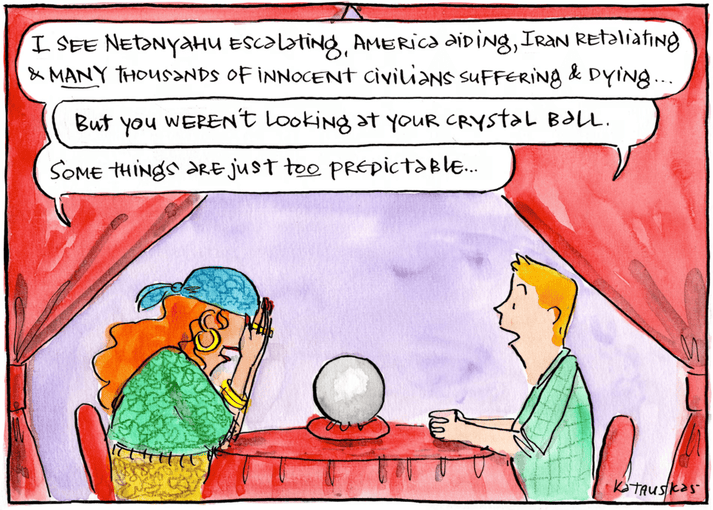
As Fiona Katauskas puts it, you don’t need a crystal ball to see where things are heading, perhaps because they don’t seem to be heading anywhere.
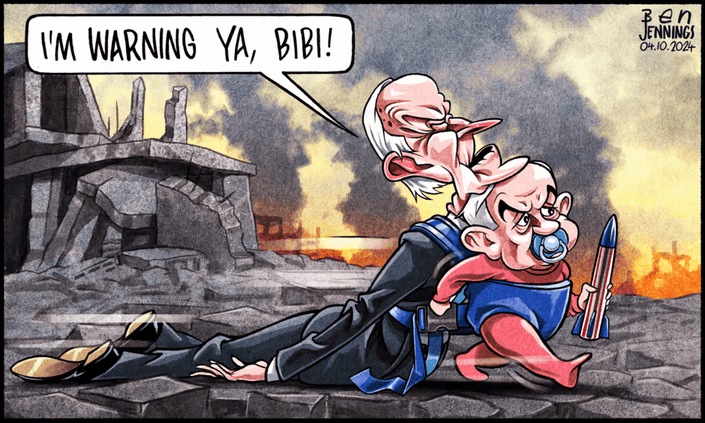
And, yes, the whole world is watching, and Ben Jennings is not the only one who is tired of wondering what it would take for the Americans to find a way to defend Israel’s existence without supporting Netanyahu’s war, a war seen in some corners as an attempt to remain in power and thus avoid prosecution for corruption.
The conundrum in this country being people who don’t want to vote for Harris because of the administration’s milquetoast approach to the war, but who risk electing, by default, Donald Trump who is an outright hawk and would be more supportive of Netanyahu’s goals, and perhaps even of Ben-Givr’s.
Juxtaposition of the Day
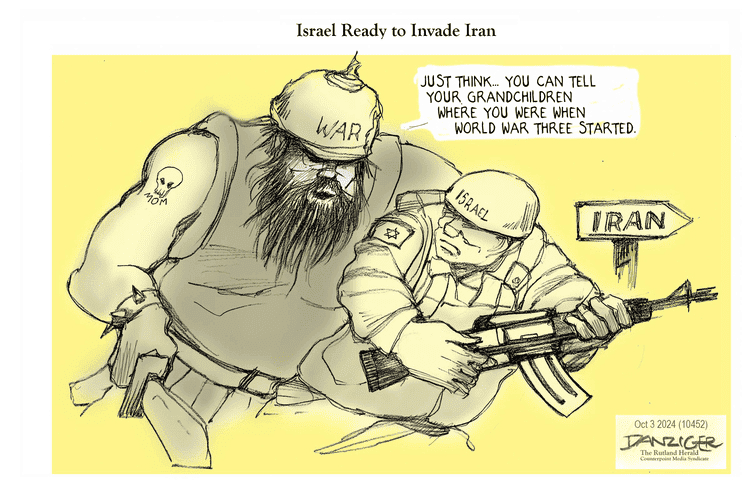

The worst part of Danziger’s vision is that it probably wouldn’t be World War III. It would just be an expansion of the same-old same-old.
But as Schrank says, having already brought Lebanon into the chaos, with additional attacks on Israel testing its Iron Dome and continuing threats from Iran, expansion is beginning to feel inevitable.
Bearing in mind that it’s rarely those who order the attacks who suffer the effects. We note the deaths of a Rabin or a Mountbatten, but there are thousands more whose names we’ll never hear, and whose cries have gone unnoticed.

Ella Baron wonders if there will be anyone to do the mourning, if things go on as they have.
It’s a reasonable question, and journalists find it hard to answer, since they not only get little access to the war but seem strangely vulnerable to accidental shootings when they are in the areas of contention.
The Committee to Protect Journalists counts 128 fatalities so far, with about that many more cases still under investigation.
Both Hamas and Israel are under investigation by the International Criminal Court for the war crimes of targeting civilians, though we’d likely need to have a winner and a loser before the unlucky one faced any sort of trial.
And “targeting” is an apt term. Many journalists wear flak jackets and helmets and have PRESS clearly displayed, but have been killed nonetheless, some dying along with civilians, others under dubious circumstances.
As CPJ Program Director Carlos Martinez de la Serna told the press, “Every time a journalist is killed, injured, arrested, or forced to go to exile, we lose fragments of the truth. Those responsible for these casualties face dual trials: one under international law and another before history’s unforgiving gaze.”
Still, it’s getting very hard not to know. Even if the journalists could be kept off the battlefields by both sides, there would still be witnesses, and everyone today can make their truth heard. Don’t read this if you’re trying not to know.
War is Hell, and unspeakable things happen in war that leave survivors waking up screaming in the night. There was a time when soldiers came home with stories they did not tell, and we others could honestly go on not knowing what had happened.
Those days are over, and when that unforgiving gaze of history looks down, it will no longer accept “We didn’t know.”
So it’s time to stand up and insist it be over.
Not because of how you feel about Jews, or how you feel about Arabs.
Because of how you feel about yourself.
And if you still hope to be able to say “We didn’t know!” do not watch this disturbing news report:

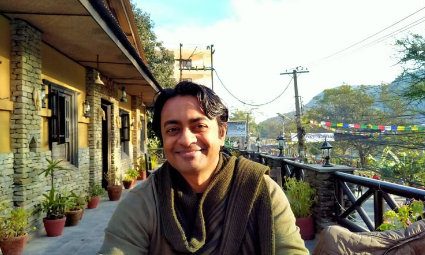
Comments 6
Comments are closed.